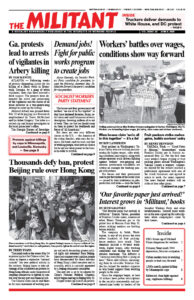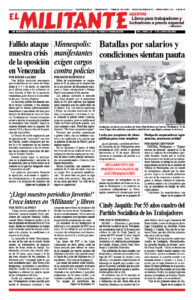
WASHINGTON — Three weeks after truckers parked their rigs by the U.S. Capitol May 1, they ended their national protest calling for an end to brokers slashing their rates and for elimination of government overregulation. An estimated 500 to 1,000 truckers participated in some part of the disciplined and spirited action, which set an example for working people.
“We made a conscious decision to stand up for our rights,” Greg Anderson, a Bardstown, Kentucky, trucker told the Militant.
Young truckers participating in their first protest joined with veterans of earlier actions. On May 20, they won one of their central demands — a meeting with officials at the White House to demand federal relief in their fight against low rates. Two representatives for the truckers met with Mark Meadows, President Donald Trump’s chief of staff, and Jim Mullen, deputy administrator for the government agency that regulates trucking.
“It’s a sort of victory,” said Sergey CJ Karman, a trucking software engineer, reporting back to a truckers’ gathering in front of the Washington Monument after the meeting. He represented the truckers along with driver Michael Landis of United States Transportation Alliance.
While the federal government representatives said they would try to meet some of the truckers’ concerns, no promises or timetables were set for federal action on broker fees.
“We feel more confident” because of the protest, Janet Sanchez, a truck dispatcher who was part of the action, told the Militant by phone as she was driving home to Ocala, Florida.
“The meeting at the White House opened a dialogue,” she said. “As long as that door stays open, we are good. If we must show our unity again, we are more prepared.”
The majority of the protesters were independent truck owners, who operate their own rigs. Some managed small fleets. Many are saddled with significant debt loads. Far-reaching government lockdowns on jobs and production over the last couple months accelerated a crisis already underway for these drivers. The trucking industry went into recession in 2019.
Drivers demand to see contracts
Some protesters said that they had not worked in at least a month, or even more. Those able to find work face unlivable rates imposed by the brokers, who are determined to generously compensate themselves. They use the sharp decline in trucking jobs to pressure drivers to accept the paltry share they are offered.
Drivers’ right to know what’s in the contracts brokers reach with shippers was one of the main issues in the protest. Truckers were angry over the widespread practice these middlemen have of requiring truckers to waive their right to know the terms of their contracts to get a job. They explain the brokers are concealing profit margins of 60% to 75%, despite the fact that brokers are required by law to comply with disclosure provisions.
Robert Voltmann, CEO of the 1,700-member brokers’ Transportation Intermediaries Association, boasted to the media, “Let the Justice Department investigate. They won’t find anything.”
The group advises its members that if truckers want to see a contract, tell them they have to come to the broker’s office, which might be thousands of miles away. Some drivers report being blackballed by brokers for refusing to waive their rights.
“The brokers are threatening to drive us out of business,” Lee Schmitt, a northern Wisconsin trucker, told the Militant. “But it’s not so easy. The industry operates at the expense of owner-operators. We bear the overhead, the risks. We’re dictated to by the government when we can drive, when to sleep. But we are the ones that move a large part of this country’s freight, and we are getting more truckers involved to get things changed.”
The truckers’ fight to defend their livelihood continues, with discussions and debates taking place on the next steps.
“We have nothing in writing, so they can promise us the world, but as soon as they get us out of D.C. who’s to say they will follow through with it?” Lana Danko, an Aurora, Missouri, owner-operator, said on Transportation Nation Network. “We are dealing with politicians.”
“Back to DC?” was the lead article on the network’s website May 25.

